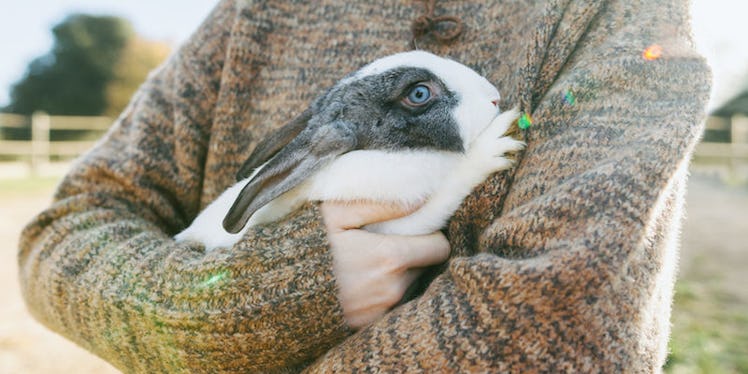
7 Completely Logical Reasons A Rabbit Should Be Your Next Pet
Bunnies make great pets. If you've ever had a cat or a dog, you know having a pet is a bold commitment to care for that creature for the rest of its life.
While pooches and kittens are great, rabbits make owning a pet seem simple and fun. These creatures come in a variety of breeds and sizes, but stopping by the animal shelter can give you some insight as to what types of rabbits are available for adoption.
Here are seven reasons to fall in love with a rabbit from your local shelter:
1. They're cuter than kittens.
OK, so I might be biased, but bunnies are just so freaking cute. I'm constantly reminded of how happy they make me. Their chubby faces, little noses and floppy ears are just too cute to be true. Having a bunny can cheer you up even more than a pint of ice cream or binge-watching your favorite show on Netflix.
2. Bunnies are gentle souls.
If you have children, rabbits would be a great addition to your household. Bunnies are typically gentle, and they'll only bite or scratch when they feel threatened. Teach your kids to be gentle with animals, especially when it comes to your new bunny.
Bunnies love to be pet softly, as they're gentle, docile creatures. When your cat is incessantly scratching your leg for food or your dog barks in your face, you'll be reminded of how much you wish you had a gentle bunny to love.
3. They can do math.
Well, not quite, but rabbits are very smart creatures. Once, I put a treat on top of my dresser for my rabbit Sabir without her seeing. Despite the dresser being nearly five feet tall, she was able to smell the treat and jump atop the dresser to get it.
Rabbits can also be litter trained to prevent making a mess, and they quickly become familiar with their owner's face and personality. Sometimes they're a little too smart for their own good.
4. They're pretty clean.
Since their poop isn't messy, rabbits tend to be very clean. In fact, rabbits eat some of their own poop to help properly nourish their bodies. The edible waste is called cecotropes, which help the rabbit's digestive system function smoothly.
You're probably thinking, "How can an animal who eats its own poop be clean?" Consider these traits:
1. Rabbits do not slobber. 2. Rabbits do not sweat. 3. Rabbits pee in their litter box. 4. Rabbits drink from a water bottle, eliminating the cleanup of excess water. 5. Rabbits eat vegetables and hay rather than messy dog or cat food. 6. Rabbits clean themselves consistently.
5. Shhh. They like quiet.
Bunnies are quiet creatures and make virtually no noise, as opposed to barking dogs and mewing cats. Occasionally, they make a high-pitched squeal when in terrible pain. Since you'll be giving your bunny a loving home, it's unlikely you'll hear that noise.
Since rabbits are relatively silent, they crave similar environments. If you're able to set your bunny's home up in a calm room or a space without a lot of loud noises, your bunny will be content.
6. They have oodles of personality.
If you've ever spent time in the company of a rabbit, you know how fun and diverse their personalities can be. I've seen grumpy rabbits, hyper rabbits and dopey rabbits. No matter their disposition, they're all adorable and playful. Having a pet with personality makes your bond even stronger.
7. They encourage you to eat better.
Rabbits eat mostly hay and vegetables. Although hay is the most important part of their diet, bunnies also love fresh veggies. While I'm buying some organic kale for them, why not buy some organic Swiss chard for me? With so many vegetables in the house, it's impossible not to indulge every once in a while.
They should only be given fruit as a treat. Avoid yogurt drops and other store-bought treats. They can contain dairy and other additives, which is detrimental to a rabbit's digestive system.
Like any animal, rabbits need proper healthcare. Dr. Judy Torchia of Nippers Corner Pet Medical Center in Nashville, Tennessee, recommends animals between the ages 1 and 6 receive annual checkups. A regular vet visit can also prevent periodontal disease, hormone imbalances, hypertension, heart disease and orthopedic diseases.
Dr. Torchia also recommends getting exams every six months for pets who are older than age 6 in order to ensure proper health well into old age.